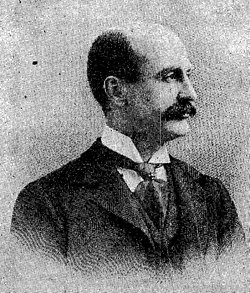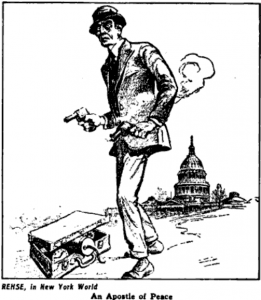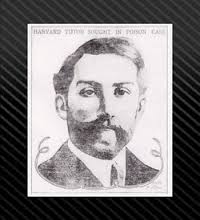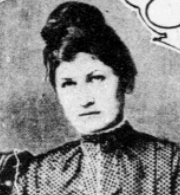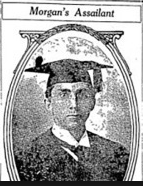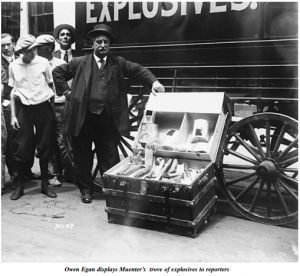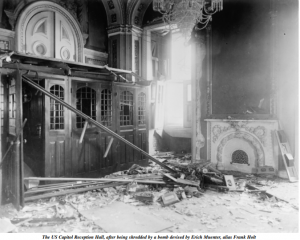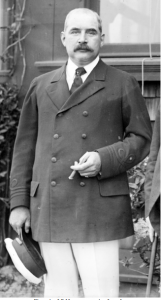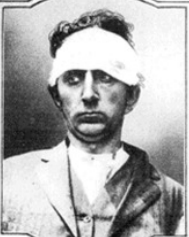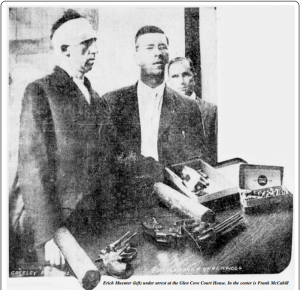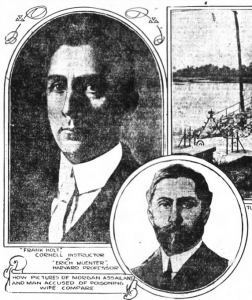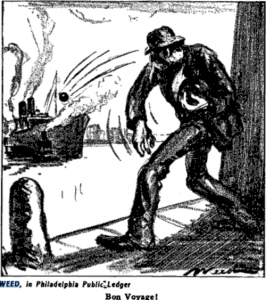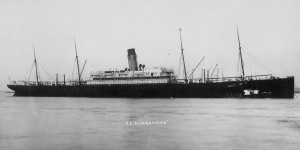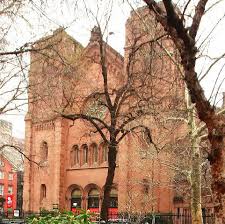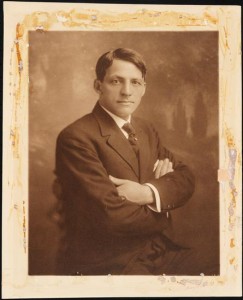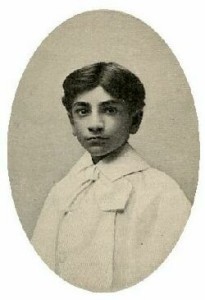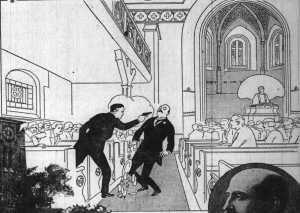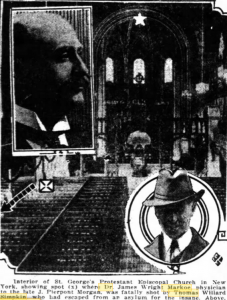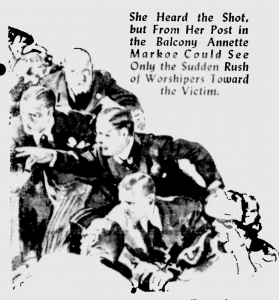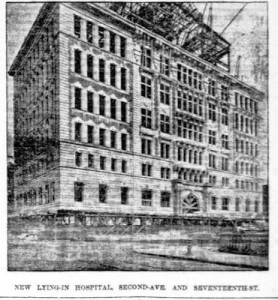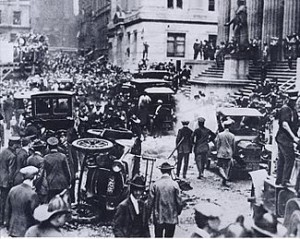William Jay Schieffelin Jr. married Annette Markoe (1897-1997). She was the daughter of Dr. James Wright Markoe, the personal physician and friend of J. P. Morgan. Morgan and Markoe were both members of St. George’s Church, where William Jay Schieffelin was a vestryman, As a project closely associated with the church. Morgan gave money to found the Lying-in Hospital, Markoe’s project (his specialty was obstetrics). Morgan, who died in 1913, left Markoe an annuity of $25,000 a years ($600,000 in 2015 dollars)
James Wright Markoe
Dr. James Wright Markoe (1862-1920), William Jay Schieffelin Jr.’s father in law, was involved in two events that show that the troubles we are now experiencing with terrorists (then German, now Islamicists) and mass murderers are not unprecedented. Nor have the legal and political issues involved in those earlier cases ever been satisfactorily resolved.
The Pacifist Terrorist
In 1915 Dr. Markoe was summoned to the house of J. P. Morgan, Jr., who had been wounded by an assailant. It was the culmination of a one-man (as far as we know) terrorist campaign.
Eric Muenter at Harvard
Eric Muenter (1875-1915) had moved with his family from Lower Saxony to Chicago when he was 18. He got his B.A. from the University of Chicago in 1899 and taught at a private school. He married Leone Krembs in He went to Harvard to work on his Ph.D and taught German at Radcliffe. In 1906 while his wife was pregnant with their second child, he slowly poisoned her with arsenic. She was a Christian Scientist and did not summon a doctor, a although she felt unwell She died ten days after giving birth, He suddenly departed from Cambridge, taking his two children and his wife’s casket which he would cremate. But the police were suspicious and had kept some tissue from the autopsy, which revealed arsenic poising. They put out a notice for his arrest, but he had vanished.
Mrs. Muenter
He had deposited the two children with relatives in Chicago and seems to have gone to Mexico There he shaved his beard and took a new name, Frank Holt. He spoke English with a German accent, but claimed to have been born in the German-speaking area of Texas. He moved to Fort Worth and studies for B.A. at Polytechnic (now Texas Wesleyan). He impressed everyone with his brilliance and married Leone Sensabaugh, who graduated the same year he did, 1909. Her father was the socially-prominent minister of the Fifth Street Methodist Church.
Frank Holt – Eric Muenter as Polytechnic Graduate
In 1910 he was an instructor at the University of Oklahoma. Then he moved to Vanderbilt University in 1911-12, then Henry & Emory College, and then to Cornell. One of his colleagues from Harvard spotted him at a conference and informed the head of the department at Cornell that Frank Holt was really Erich Muenter, but no one informed the police. Muenter-Holt accepted a position in Dallas and his wife moved there to set up house.
After the war began in August 1914, Muenter-Holt brooded over the mounting casualty lists. He decided the need to do something dramatic to get the attention of the United States and force it to realize the folly and horror of war. He went to New York and rented a house under the name of Patton, There he assembled a bomb factory, buying 150 lbs. of dynamite under the name of Hendricks.
On July 2, 1915, he took a train to Washington and entered the Capitol building. Security was non-existent. He wanted to place a bomb in the Senate Chamber but it was locked. He placed the bomb in the ante-room and timed it to go off at 11:23 p.m. to avoid causalities. He went to Union Station and waited for the midnight rain to New York. He heard the bomb go off.
He wrote, under the name of Pearce, to the Washington papers:
We stand for PEACE AND GOOD WILL to all men, and yet, while our European brethren are madly setting out to kill one another we edge em on and furnish them more effective means of murder. Is it right? We get rich by exportation of explosives, but ought we to enrich ourselves when it means the untold suffering and death of millions of our brethren and their widows and orphans?
By the way, don’t put this on the Germans or on Bryan. I am an old-fashioned American with a conscience, if it is not a sin to have a conscience). We are within the international law when we make this blood money but are we also within the moral law, the law of Peace, or of Love, or of Christ, or whatever else a Christian nation may call it? Are we within reason? Our children have to live after us. Europe helped and encouraged the Balkans in their bestial ware, and she reaped the whirlwinds. Can’t we learn wisdom? Is it right to supply an insane asylum with explosives? Or give them to children? We even prevent our own children to kill and maim themselves at the rate of 200 dead and 5,000 maimed on the glorious Fourth. How much more should we not hesitate to furnish strangers, and they mad? Will our explosives not become boomerangs? If we are willing to disregard our ideals for a dollar, will they hesitate some day when they get a chance? A prostitute sells out for a dollar. Fi! Columbia too?
Wilson said in his Decoration Day speech that the war developed national spirit. Good! Now let peace make for national spirit. Let all real Americans say: “We will not be a party to this wholesale murder!” Would that not be national spirit? Better than one based on the murder of our fellow-man.
“I, too, have had to use explosives (for the last time I trust). It is the export kind, and ought to make enough noise to be heard above the voices that clamor for war and blood money. This explosion is the exclamation point to my appeal for peace.”
He had written letters to the newspaper denouncing J. P. Morgan, Jr.’s financing of the Allies in the war.
Muenter took the early train to Glen Cove, Long Island on July 4, 2015. J. P. Morgan, Jr., and his family were having breakfast with the British ambassador.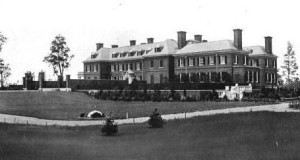
Matinecock Point
Presenting his business card to the butler, he asked to be directed to Morgan. The butler refused but upon being confronted with two pistols pulled from Holt’s pockets deceived him by leading him to the distant library. Morgan and his family were, in fact, breakfasting at the other end of the mansion with the British ambassador. Soon realizing he had been deceived Holt began a search, with the butler at gunpoint, room to room. Upon their approach to the dining area, the butler shouted out a warning and the family scrambled for cover.
Muenter, realizing that the he had been fooled by the butler, had started back to the main staircase. Along the way, he heard voices from a small side room. He entered to find Morgan’s younger children at play. He pointed a pistol at them. “Where is Mr. Morgan?” he asked. The children didn’t answer. Muenter demanded they follow him. Finding the main hallway deserted, he started up the main staircase, the children following a few steps behind. As Muenter reached the second floor landing, a loaded revolver in each hand, he yelled out “Now, Mr. Morgan, I have you!” Seeing the pistols, Mrs. Morgan heroically tried to place herself between Muenter and her husband. Morgan pushed her aside, and lunged at Muenter. Muenter fired two rounds into Morgan before he was smashed to the ground by the 220-lb bulk of the millionaire. He pulled the trigger two more times, but the gun misfired both times. Morgan landed with the weight of his body squarely on Muenter They struggled for a moment until Morgan twisted the revolver from Muenter’s hand. Morgan had landed in such a way that he had accidently pinned Muenter’s left hand, holding the second revolver, to the floor in such a way that Muenter was unable to fire it. Morgan’s wife, Sir Cecil Spring-Rice and Miss McCabe pried the second revolver from Muenter’s grasp.
After taking away his guns and tying him up for the police, another servant noticed the dynamite sticking out of Holt’s pocket. The dynamite was immediately placed in a pail of water. “
Dr. Markoe and the police were summoned. Morgan survived. But Muenter did not live long.
Muenter explained his plan to the police:
I have a well-trained mind and I studied for a long time as to what would be the proper course for me to pursue before I decided to take the matter up with Mr. Morgan personally… I wanted to go to every manufacturer personally, and persuade him to stop this traffic. It was physically impossible for me to do this, but Mr. Morgan, with his great influence could do what was impossible for me, and so I decided to apply to him.” He explained that it had been his intention to take Morgan’s wife and children hostage. Muenter intended to seal them into a room while he forced Morgan to do his bidding to stop munitions shipments to Europe. He had planned to cut a small hole with his pocketknife in the doorway of the room he placed the Morgan family in, through which he intended to pass food during what even he perceived would have been a lengthy siege.
Muenter was questioned by the police:
MacDonald next asked Muenter whether or not he thought he had a legal right to take action against Morgan. Muenter responded that it had “…nothing to do with legal right. My dear sir, this is war, you are mistaken.” “But we are not at war.” “You are wrong. We are at war. We are actually at war, we are killing thousands of people every day.” “But we haven’t declared war,” MacDonald reminded him. “Yes, we are doing it underhandedly,” Muenter replied. “Do you think that you, single-handed, could arrest the whole trend of an age?” “No, but Mr. Morgan could.”
Muenter with his guns and dynamite
Police quickly suspected that Holt and Muenter were the same person.
Muenter’s wife received a letter from her husband. Among other things he wrote
Second: The steamer leaving New York for Liverpool on July 3 should sink, God willing, on 7th; I think it is the Philadelphia or the Saxonia, but am not quite sure, as according to schedule these two left on 3d.
England-bound ships were radioed; In July 7, the Minnehaha, a Morgan-owned ship transporting explosives, had an explosion and caught fire.
S. S. Minnehaha
Muenter, realizing that his plan had failed, tried to commit suicide by opening an artery with the metal band around a pencil eraser. He was stopped and was put on suicide watch. A guard was stationed outside the open door so he could rush in and stop any suicide attempt. The guard heard another noise and left for a moment to investigate. Muenter rushed out the open door, climbed up some bars, and dove head first onto a concrete floor twenty feet below, killing himself instantly.
He had left a suicide note for his wife
To my dears: I must write once more. The more I think about it, the more I see the uselessness of living under circumstances such as these. Bring up the dear babies in the love of God and man. God bless you, my sweet. Affectionately, -Frank PS — All please pardon me for all the heartaches I have brought you. Pray with me that the slaughter will stop. My heart breaks. Good-bye.
(Many thanks to David Russell, The Day Morgan was Shot.)
________________________________________________
The Homicidal Lunatic
This was not to Dr. Markoe’s last brush with the mentally erratic.
Thomas Simpkin, a London-born printer, had left England and moved to Canada. He enlisted in the Canadian Army in 1914, but soon deserted and joined his wife in the United States. He became increasingly erratic and was hospitalized. He escaped and made his way home to Duluth. He was institutionalized again and escaped again.
He drifted down to Virginia, took a job under his wife’s maiden name, and felt one of his spells coming on in Williamsburg, Va. He had himself voluntarily hospitalized, and was classified as harmless. He escaped and went to New York.
William Jay Schieffelin, Jr. and his wife Annette were on the West Coast.
St. George’s Church
On April 19, 1920, his father- and mother-in-law, Dr. and Mrs. (Annette) Markoe, arrived at St. George’s for the 11 A.M. Sunday morning service. Mrs. Markoe went up into the gallery, while Dr. Markoe stayed on the ground floor. The famous Armenian tenor was singing at the service
Simpkin liked to go to church services. He heard the sound of the bells at St. George’s and entered the doors. An usher directed the shabbily dressed man to a pew.
Rev. Karl Reiland
The rector, Dr. Karl Reiland, chose to preach on Ephesians iv, 18:
Ignorance of God through a darkened understanding and blindness of heart
The rector dwelt particularly upon the necessity of church members extending good fellowship of the real, warm-hearted sort to newcomers; to strangers who seemed to be friendless. He asked his members to go out of their way to be hospitable to men and women of lonely hearts or distressed minds. He reminded them that such approaches might mean the difference between discouragement and fresh hope. He said that there was nothing more important in the practice of the Christian religion than the proffer to poor or rich or warm-hearted churchly hospitality.
The organist and choir began the offertory anthem. The Armenian tenor, George Bagdasarian, began the anthem Seek ye the Lord.
George Bagdasarian
The usual usher was away, so Dr. Markoe assisted Herbert Satterrlee, J. P. Morgan’s brother in law, and passed the plate. As he arrived at Simpkin’s pew, Simpkin took a revolver out of his pocket and shot Markoe in the head over the left eye.
The rector, Dr. Reiland, recounted:
Suddenly I heard a shot. I thought maybe it was an automobile at first. Then I thought it might be some Bolshevik who had come into the church to get somebody. There was a second shot, bang, like that, and then I heard the collection plate fall. It made a noise like crashing glass. The third shot I thought was a bomb.
Simpkin in lower right corner
Simpkin was running out of the church and shot at the sexton who was blocking his way.
I jumped up and looked down the aisle and saw the door open and a man run out. Then I realized that someone had been shot. Safford, the organist, stopped playing for an instant. I motioned him to continue and the little boys and girls in the choir to keep on singing. I ordered my four assistants to remain behind and continue the service. Bagdasarian was a trump. He kept right on singing.
Then I threw my Bible into the pulpit and leaped the chancel rail and started down the center aisle after the man.
I shouted to several ushers ta the head of the aisle “Get that man!” They told me several men were after him.
Simpkin ran toward the Stuyvesant Square Park. Several young men saw him coming with the others in pursuit and blocked his way. Simpkin turned to face his pursuers.
Dr. George Brewer, a medical officer in Would War I and a friend of Markoe’s, grappled Simpkin and pinned his gun arm to his side. Simpkin fired it, giving Brewer a flesh wound in the leg. Simpkin was subdued and taken to jail.
George Earl Warren was seated two pews back of Simpkin’s. He jumped into the aisle and caught Markoe before he touched the floor. As they carried Markoe out, he whispered, “I’ll be all right.” But when they arrived at the emergency room of the Lying-In Hospital, he was dead.
At the funeral in St. George’s there was a heavy police presence; no one was allowed near the church without a card of invitation. J. P. Morgan, Jr. attended.
Simpkin claimed he had come to America to kill J. P. Morgan, Sr., but then learned that he was already dead. He had no idea who Markoe was. Simpkin was also a Spiritualist and said that the spirits often spoke to him and they told him to shoot Markoe.
Simpkin was committed and died in the asylum at Matteawan four years later.
Alienists,a s psychiatrists weer the called, pointed out the problems the legal system created in dealing with the insane before they committed a serious crime.
At that time if a person was declared insane in one state, he was not automatically considered insane in other states. If he escaped to another state, the process had to begin all over again.
A Dr. Brill
said there are many persons of the same type as Simpkin at large, as they can readily conceal their dementia.
“The trouble is that we cannot keep them in the asylum always,” said Dr. Brill, “because relatives and friends who visit the place talk to the victims superficially and imagine them to be entirely cured. The take the case to the courts, and the jury, not knowing any better, orders the person to be released.
A Dr. Heyman said that
“men if the paranoiac type usually are adroit and plausible until they commit some overt act, and then, for perhaps the first time, their insanity is made known to the lay mind.”
_________________________________________________
A few months later, Morgan was again targeted.
The Wall Street bombing occurred at 12:01 pm on September 16, 1920, in the Financial District of Manhattan, New York City. The blast killed 30 people immediately, and another eight died later of wounds sustained in the blast. There were 143 seriously injured, and the total number of injured was in the hundreds. The bombing was never solved, although investigators and historians believe the Wall Street bombing was carried out by Galleanists (Italian anarchists), a group responsible for a series of bombings the previous year. The attack was related to postwar social unrest, labor struggles and anti-capitalist agitation in the United States.
The New York assistant district attorney noted that the timing, location, and method of delivery all pointed to Wall Street and J.P. Morgan as the targets of the bomb, suggesting in turn that it was planted by radical opponents of capitalism such as Bolsheviks, anarchists, communists, or militant socialists.
Men were knocked off their feet, including a young stockbroker named Joseph P. Kennedy. There was carnage. A woman’s head was discovered stuck to the concrete wall of a building, with a hat still on it. The head of the horse was found not far from the blast, but its hooves turned up blocks away in every direction. Morgan himself was on vacation across the Atlantic, but his son Junius was injured, and Morgan’s chief clerk, Thomas Joyce, was killed.
Our current problems with terrorism had their precedent in the early twentieth century. The United States had a large immigrant population. An element of the German population was more loyal to the Kaiser than to the United States, The Irish hated the English. Italians had an anarchist element. Russian Jews had a Bolshevik element.
Today the only immigrant population that harbors disloyal elements is the Moslem (perhaps 2% of the population) and only a miniscule fraction of them are disloyal.
The problem of the mentally ill remains with us. It is even harder today than it was then to commit someone involuntarily. Paranoid schizophrenics can be intelligent and conceal their illness. Often an erratic person will give only moderate signs before engaging in mass murder. It is harder to buy dynamite, but it is easy for a mentally ill person to get a gun, or a whole arsenal.
As to Muenter: he gave no clue as to why he murdered his first wife, and his plan to have Morgan end the war was deeply irrational. But how rational were the government officials and generals and financiers who kept the slaughter going year after year?
